Nightlife in Dubai – What’s Legal, What’s Not
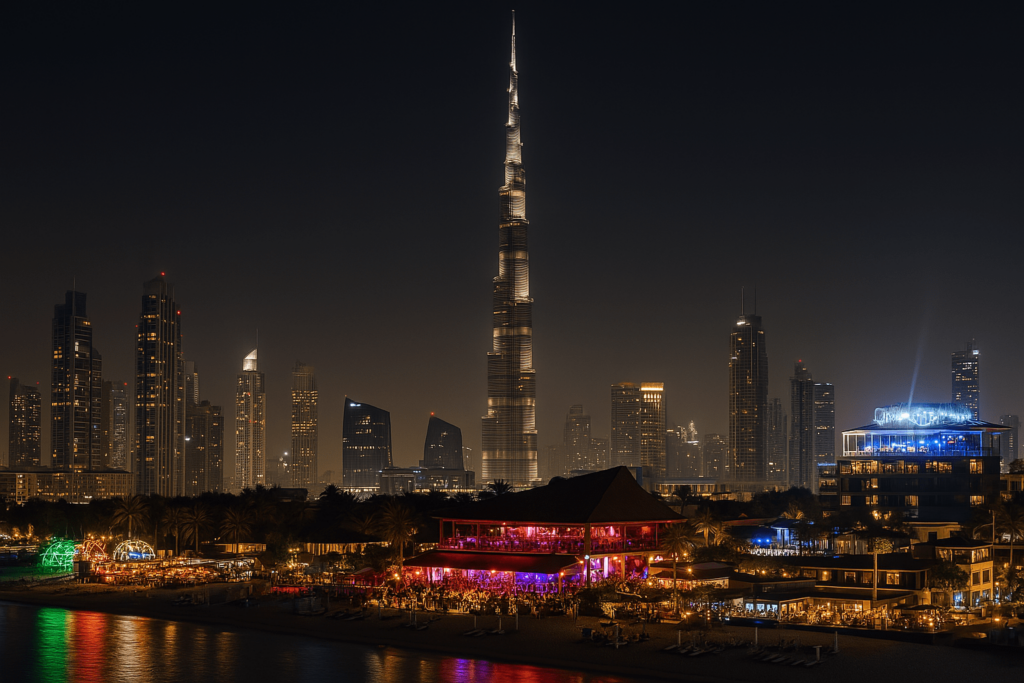
Dubai is known for its glitzy skyline, luxury experiences, and vibrant nightlife. But unlike party destinations like Ibiza or Bangkok, Dubai follows a unique set of laws and cultural norms rooted in its Islamic heritage. If you’re wondering what’s allowed and what’s not in Dubai’s nightlife, this 2025 guide breaks it down clearly so you can enjoy your evenings without crossing any legal lines. Is Nightlife Legal in Dubai? Yes, nightlife is legal in Dubai — including bars, clubs, beach parties, and concerts. However, it’s strictly regulated. Most venues operate inside licensed hotels and follow rules regarding alcohol service, dress code, and behavior. Visitors can enjoy world-class DJ sets, rooftop lounges, and even late-night beach clubs — all within the boundaries of the law. Legal Nightlife Activities in Dubai (✅) Illegal or Restricted Nightlife Activities in Dubai (❌) Top Nightlife Spots in Dubai (2025) Here are some of the best legal places to experience Dubai’s nightlife: Alcohol Laws to Know As of 2023, tourists are no longer required to obtain an alcohol license for personal consumption in Dubai. However: Dress Code Tips for Dubai Nightlife Dubai is fashion-forward, but modesty is still expected in some settings. Here’s what works: Can You Party During Ramadan? Yes, but with restrictions. During Ramadan, nightlife continues behind closed doors. Many venues operate quietly without loud music or alcohol until after sundown. Always be respectful of local customs during this time. Safety & Etiquette Tips Conclusion Dubai offers a lively, luxurious, and unique nightlife experience — but it’s essential to follow the rules. Stick to licensed venues, drink responsibly, and show respect for the local culture. By understanding what’s legal and what’s not in Dubai nightlife, you can enjoy unforgettable nights in one of the safest and most glamorous cities in the world. FAQ
Understanding Emirati Culture – 10 Things to Know Before Visiting Dubai

Dubai is a modern, multicultural city, but at its heart lies a rich Emirati culture rooted in tradition, religion, and hospitality. Whether you’re a tourist or a new expat, gaining insight into local customs will enhance your experience and help you show respect. Here are 10 key things to know about Emirati culture when visiting or living in Dubai. 1. Islam is Central to Daily Life The UAE is a Muslim country, and Islamic values shape many aspects of life. Expect to hear the call to prayer (adhan) five times a day, and observe shorter working hours during Ramadan. While Dubai is tolerant, respecting Islamic practices — such as avoiding public eating during fasting hours in Ramadan — is essential. 2. Modesty in Dress is Respected Dubai is more relaxed than other Gulf cities, but dressing modestly is still appreciated. Women should avoid overly revealing clothing in public places like malls or government buildings. Men should also avoid going shirtless outside the beach or pool. Shoulders and knees covered is a good rule of thumb. 3. Emirati Hospitality is Generous Hospitality is a cornerstone of Emirati culture. If you’re invited to an Emirati home, expect dates and Arabic coffee to be served. It’s polite to accept with your right hand and express gratitude. Guests are treated with deep respect — it’s considered an honor to host someone. 4. The Arabic Language While English is widely spoken in Dubai, Arabic is the official language. Learning a few basic words like “Shukran” (Thank you) and “Salam Alaikum” (Peace be upon you) shows cultural respect. Many signs, government documents, and public announcements are in both Arabic and English. 5. Family is the Foundation Family plays a central role in Emirati life. Households often include extended family members, and strong bonds are maintained through weekly gatherings and shared meals. Emirati society places high importance on loyalty, respect for elders, and community values. 6. Public Behavior Etiquette Dubai is cosmopolitan but has cultural boundaries. Public displays of affection (PDA), such as kissing or hugging, should be avoided. Swearing, loud arguments, and gestures deemed offensive can lead to fines or legal action. Respect for others’ space and dignity is part of daily etiquette. 7. The Role of Women Emirati women are highly respected and have a growing presence in education, business, and government. They often wear the traditional abaya and shayla, though this is a choice. Visitors should be mindful and courteous when interacting with women — avoid physical contact unless initiated and always ask permission for photos. 8. Religion and Non-Muslims Dubai is open to all faiths. You’ll find churches, temples, and gurdwaras operating freely. However, proselytizing or disrespecting Islam in any way is a serious offense. Visitors of all beliefs are welcome — as long as they show respect for the UAE’s religious foundation. 9. Traditional Clothing and Identity Many Emiratis wear traditional dress with pride. Men wear the white kandura and headscarf (ghutra or shemagh), while women wear the abaya. These garments are not just for tradition, but also for comfort in the hot climate. It’s respectful not to imitate these outfits for fun or fashion. 10. Coffee and Dates – Symbols of Welcome Arabic coffee (gahwa) and dates are not just snacks — they’re symbols of hospitality. Served at homes, offices, and events, they represent a warm welcome. Accept with your right hand and slightly shake the coffee cup when finished — a small but meaningful cultural gesture. Conclusion Understanding and appreciating Emirati culture helps you connect more deeply with the people of Dubai and the UAE. It’s a culture of pride, hospitality, and respect — values that shine even in the city’s fast-paced, global environment. Embrace the traditions, and your experience in Dubai will be all the more rewarding. FAQ
History of Dubai – From Desert Settlement to Global City
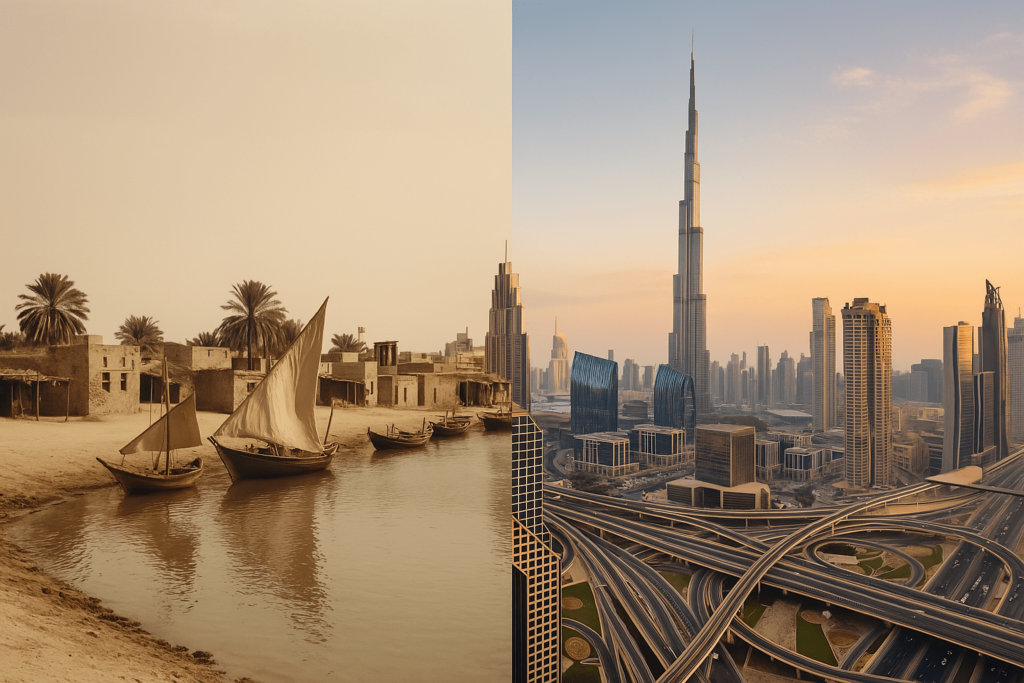
Dubai, one of the world’s most modern and glamorous cities, has a rich and fascinating history rooted in trade, tradition, and transformation. Once a quiet fishing village on the Arabian Gulf, it has evolved into a global hub for business, tourism, and innovation. Let’s explore the history of Dubai and how it became the futuristic metropolis we know today. 1. Early Beginnings – Life Before the Skyscrapers Long before oil and luxury towers, Dubai was a small coastal settlement inhabited by the Bani Yas tribe. Archaeological finds suggest human activity in the region dating back to the Bronze Age (around 3000 BCE). The city’s natural creek made it a prime location for fishing, pearl diving, and trade with nearby regions like Persia, India, and East Africa. 2. The Rise of a Trade Hub (18th – 19th Century) Dubai was officially established as a town in the early 18th century. By 1833, the Al Maktoum family, still the ruling dynasty today, took control. Thanks to its strategic location, Dubai became a growing port city, welcoming traders and merchants. The city offered low taxes and a business-friendly environment, attracting settlers from Iran and India, laying the foundation for a multicultural society. 3. The Pearl Industry Boom (19th – Early 20th Century) From the late 1800s to the early 1900s, pearl diving was the lifeline of Dubai’s economy. Hundreds of dhows would sail each season in search of pearls, providing employment and wealth for many. However, the industry collapsed in the 1930s due to the rise of cultured pearls in Japan and the global economic downturn. 4. Discovery of Oil and Transformation (1960s – 1980s) Everything changed with the discovery of oil in 1966. Under the leadership of Sheikh Rashid bin Saeed Al Maktoum, the city used oil revenues to build infrastructure — roads, ports, schools, hospitals, and airports. In 1971, Dubai joined with other emirates to form the United Arab Emirates (UAE). Unlike other oil-rich nations, Dubai began investing heavily in diversification early on, focusing on trade, tourism, aviation, and finance. 5. The Vision of Sheikh Mohammed (1990s – 2000s) Under Sheikh Mohammed bin Rashid Al Maktoum, who became ruler in 2006, Dubai launched ambitious projects to redefine the city on a global scale. Iconic developments like: transformed Dubai into a symbol of ambition, innovation, and luxury. 6. Expo 2020 and the Future of Dubai In 2021, Dubai hosted Expo 2020 (postponed due to COVID-19), attracting millions of visitors and showcasing the city’s commitment to technology, sustainability, and global collaboration. The event cemented Dubai’s status as a forward-thinking city with global influence. Today, Dubai continues to diversify with initiatives like Dubai 2040 Urban Master Plan, focusing on green spaces, innovation, and sustainable living. It’s also positioning itself as a leader in AI, blockchain, space exploration, and digital finance. Conclusion From a small pearl-diving village to a futuristic skyline that touches the clouds, the history of Dubai is a story of vision, resilience, and transformation. Rooted in tradition but focused on the future, Dubai is not just a city — it’s a symbol of what ambition can build. FAQ
Top 10 Must-Visit Attractions in Dubai (2025 Travel Guide)
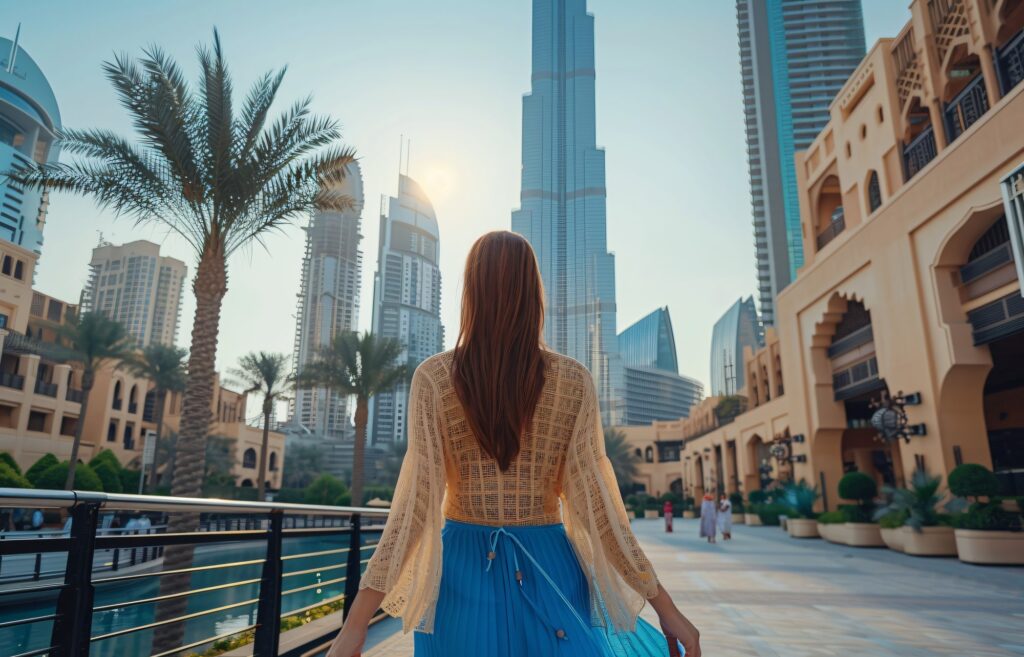
Dubai is a dazzling destination where modern luxury meets cultural heritage. Whether you’re planning your first visit or returning for more adventure, these top 10 attractions in Dubai will make your trip unforgettable. From record-breaking skyscrapers to peaceful desert dunes, here’s what you can’t miss in 2025. 1. Burj Khalifa – World’s Tallest Building The Burj Khalifa soars 828 meters above the city, making it the tallest structure in the world. Visitors can head to the Observation Deck on the 148th floor for breathtaking panoramic views. The high-speed elevator ride is an experience in itself, and the view at sunset is simply unmatched. The surrounding area is beautifully landscaped, with fountains and walking paths perfect for photos. 2. The Dubai Mall – More Than Just Shopping Adjacent to Burj Khalifa, The Dubai Mall is one of the world’s largest shopping and entertainment destinations. It houses over 1,200 retail stores, an Olympic-sized ice rink, the Dubai Aquarium & Underwater Zoo, and countless restaurants. You can easily spend a whole day here, whether you’re shopping designer brands or enjoying the immersive VR Park. 3. Dubai Fountain – Dazzling Night Show The Dubai Fountain is a spectacular water, music, and light show performed on the Burj Lake outside Dubai Mall. Each show features classical, Arabic, or world music paired with beautifully choreographed water jets reaching up to 150 meters high. It’s free to watch and runs every 30 minutes in the evenings, attracting crowds who gather to witness the magic. 4. Palm Jumeirah – Luxury on a Man-Made Island Palm Jumeirah is a man-made island shaped like a palm tree, famous for its luxurious resorts, restaurants, and private beaches. A visit here wouldn’t be complete without exploring Atlantis The Palm, home to Aquaventure Waterpark and The Lost Chambers Aquarium. Take in sweeping views from The View at The Palm observation deck or relax at one of the beach clubs lining the crescent. 5. Dubai Marina – Waterfront Glamour Dubai Marina is a vibrant urban area featuring a stunning canal lined with skyscrapers, high-end dining, and luxury yachts. It’s a popular spot for sunset walks, al fresco dining, and water sports. Don’t miss a Dhow Cruise with dinner, which offers views of the skyline from the water. The area also connects directly to the beach at JBR, making it perfect for day and night exploration. 6. Desert Safari – Adventure in the Arabian Sands A Dubai Desert Safari is a must-do adventure. Ride a 4×4 through the dunes, try sandboarding, and enjoy camel rides before settling into a Bedouin-style camp. Evenings include a BBQ dinner, traditional Tanoura and belly dancing shows, and henna art. Morning safaris are available too, offering a serene desert sunrise. Most tour packages include hotel pickup and drop-off. 7. Dubai Frame – Past Meets Future The Dubai Frame is a 150-meter-high golden structure shaped like a picture frame, offering sweeping views of both Old Dubai and the modern skyline. Inside, you’ll find a museum narrating the city’s transformation. A highlight is the glass-floored bridge at the top, giving you a thrilling walk above the city. It’s a symbolic bridge between Dubai’s rich heritage and visionary future. 8. Global Village – Festival of Cultures Global Village is an open-air cultural and entertainment complex that showcases food, crafts, music, and traditions from over 90 countries. Open seasonally (October to April), it features pavilions representing each nation, thrill rides, live performances, and a carnival atmosphere. It’s a favorite for families and food lovers looking to explore global flavors in one place. 9. Al Fahidi Historical Neighborhood (Al Bastakiya) Travel back in time at the Al Fahidi Historical District, where you’ll find Dubai’s heritage preserved in traditional wind tower houses, narrow alleys, and art galleries. Explore the Dubai Museum inside Al Fahidi Fort, sip coffee in atmospheric courtyards, and discover local crafts and calligraphy. It’s a peaceful break from the skyscrapers and a look at life before oil and mega development. 10. Museum of the Future – Imagination Brought to Life The Museum of the Future is one of Dubai’s latest architectural and experiential landmarks. With its iconic torus design, the museum focuses on emerging technologies, AI, space exploration, and climate innovation. Exhibits are interactive and highly immersive, encouraging visitors to envision the world in 2071. It’s not just for tech geeks — it’s an inspiring stop for all ages. Conclusion Dubai’s attractions are as diverse as they are awe-inspiring. From soaring towers and glittering malls to ancient neighborhoods and desert escapades, the city truly offers something for everyone. Whether you’re an adventure seeker, a history buff, or a luxury traveler, these top 10 Dubai sites will help you make the most of your trip in 2025 and beyond. FAQ How many days are enough to explore Dubai? – A 5 to 7-day trip is great to experience major highlights comfortably. What is the best time to visit Dubai? – November to March is ideal for pleasant weather. Is Dubai suitable for families? – Absolutely! Attractions like Global Village, Dubai Mall, and Desert Safari are perfect for kids and adults alike.
Where to Go Shopping in Dubai – Best Malls, Markets & Boutiques (2025)
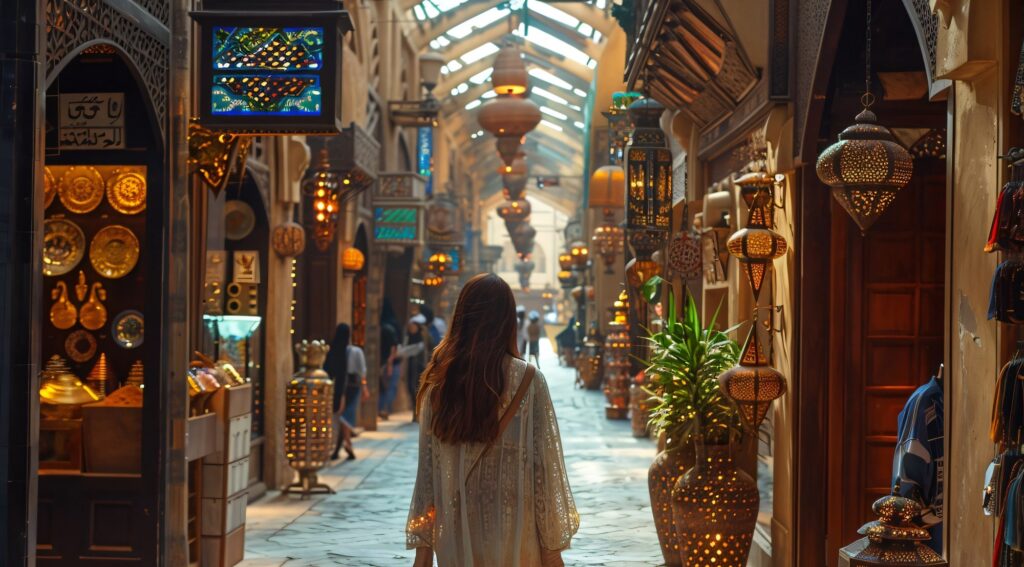
Dubai is one of the world’s top shopping destinations, known for its mega malls, traditional souks, and high-end fashion boutiques. Whether you’re looking for luxury brands, electronics, gold, or souvenirs, this guide to where to go shopping in Dubai in 2025 has you covered. 1. The Dubai Mall – World’s Largest Shopping Destination The Dubai Mall is more than a mall — it’s a full-day experience. With over 1,200 retail stores, including luxury brands like Chanel, Louis Vuitton, and Cartier, plus mid-range favorites like Zara and H&M, it’s perfect for every budget. Don’t miss the Dubai Aquarium, VR Park, and giant indoor waterfall while you shop. 2. Mall of the Emirates – Shopping & Skiing in One Mall of the Emirates is home to over 600 stores and the famous Ski Dubai indoor ski slope. It features brands like Apple, Harvey Nichols, and Sephora. Fashion lovers can shop at Valentino, Burberry, and Dolce & Gabbana. The mall also offers a wide range of dining and entertainment options, including VOX Cinemas and Magic Planet. 3. Ibn Battuta Mall – A Cultural Shopping Journey Ibn Battuta Mall is themed around the travels of explorer Ibn Battuta, with sections representing China, India, Persia, Egypt, and more. The mall has over 270 shops and is great for both shopping and sightseeing. It’s ideal for finding mid-range fashion, electronics, books, and home decor. 4. Dubai Festival City Mall – Waterfront Views + IKEA Located along Dubai Creek, Festival City Mall combines waterfront views, open-air dining, and a wide range of international stores. Popular brands include Zara, H&M, IKEA, and Marks & Spencer. After shopping, catch the IMAGINE fountain show, a world-record-breaking light and water performance. 5. City Walk – Boutique Shopping Meets Street Style City Walk is a modern outdoor shopping destination combining art, fashion, and food. It features niche designer boutiques, concept stores, and popular international brands like Calvin Klein, Coach, and Swarovski. It’s also a top spot for street photography, live music, and unique cafes. 6. Dubai Outlet Mall – Bargains on Designer Brands Looking for discounts? Dubai Outlet Mall offers up to 90% off on global brands like Adidas, Diesel, Michael Kors, and Nike. It’s located slightly outside the city center but is perfect for bargain hunters. You’ll also find great deals on electronics, perfumes, and children’s fashion. 7. Gold Souk – Traditional Market for Gold & Jewelry In the heart of Deira, the Gold Souk is one of the oldest and most iconic places to shop in Dubai. Dozens of shops offer intricate gold jewelry, diamonds, and precious stones at competitive prices. Don’t forget to negotiate! This is the go-to place for gold in the Middle East. 8. Spice & Perfume Souks – A Burst of Culture Next to the Gold Souk, you’ll find Dubai’s Spice and Perfume Souks, overflowing with colorful spices, traditional oud perfumes, incense, and herbal remedies. This is a fantastic spot for souvenirs and local specialties like saffron and frankincense. 9. Souk Madinat Jumeirah – Modern Souk Experience Souk Madinat is a charming, modern re-creation of a traditional Arabian market, located near the Burj Al Arab. It features boutique shops selling handmade goods, jewelry, carpets, and artworks. Enjoy a boat ride through the canals or dine with a view of the Burj Al Arab. 10. Mercato Mall – Italian-Style Elegance Mercato Mall brings a slice of Italy to Dubai with its Renaissance-style architecture. It’s cozy and elegant, home to brands like Gap, Mango, and Laura Ashley. Less crowded than larger malls, it offers a relaxed and refined shopping atmosphere. Bonus Tip: Dubai Shopping Festival (DSF) If you’re visiting between January and February, don’t miss the Dubai Shopping Festival — a month-long event with massive discounts, raffles, fireworks, and live concerts. It’s the best time of year to shop in Dubai! Conclusion From luxury malls and local souks to outlet bargains and boutique streets, shopping in Dubai is an adventure in itself. Whether you’re looking for gold, fashion, tech, or souvenirs, there’s a perfect spot for every style and budget. Make sure to wear comfortable shoes — you’ll need them! FAQ
Best Places to Eat in Dubai – Top Restaurants & Hidden Gems (2025)
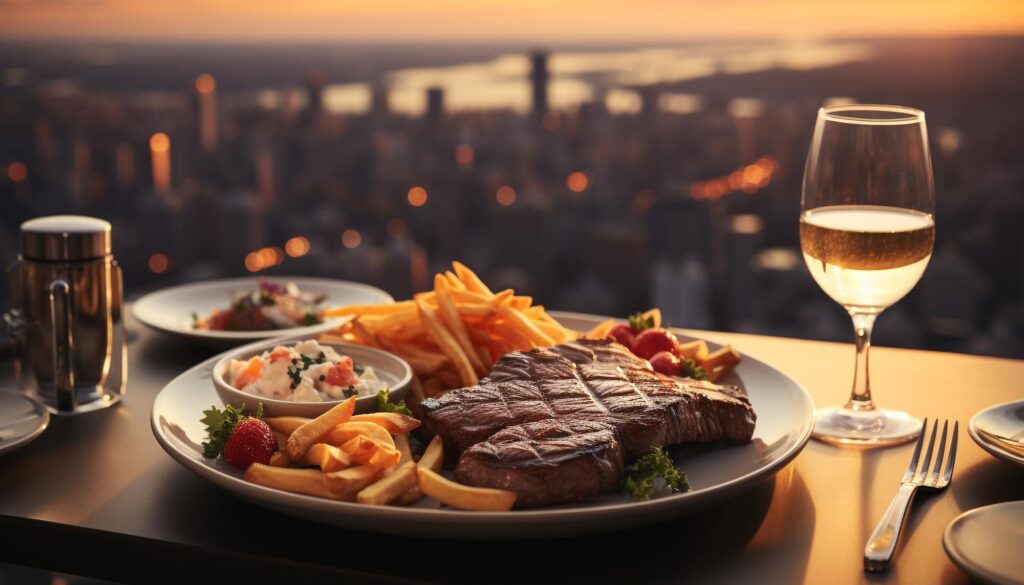
Dubai is a culinary paradise where flavors from around the world blend seamlessly with local Emirati cuisine. Whether you’re looking for Michelin-star restaurants, street food stalls, or authentic Middle Eastern dishes, this guide to the best places to eat in Dubai in 2025 will satisfy every craving. 1. Al Fanar Restaurant – Traditional Emirati Experience Al Fanar offers a nostalgic trip to old Dubai with traditional Emirati decor and flavors. Located in several spots like Festival City and Time Out Market, the menu includes dishes like machboos (spiced rice with meat), regag bread, and luqaimat (sweet dumplings). A must-visit for cultural immersion through food. 2. Zuma – Modern Japanese in DIFC Zuma is consistently ranked among Dubai’s top fine-dining spots. Located in the DIFC financial district, Zuma serves modern Japanese izakaya-style dishes. The black cod, sushi platters, and miso-marinated lamb chops are crowd favorites. Its stylish ambiance and world-class service make it perfect for business dinners or special occasions. 3. Ravi Restaurant – The Legendary Pakistani Spot Ask any local about budget-friendly eats and they’ll say Ravi Restaurant. Located in Satwa, this no-frills joint serves flavorful Pakistani dishes like chicken tikka, mutton karahi, and naan at unbeatable prices. Open late and always busy, it’s a favorite of locals, expats, and food bloggers alike. 4. Pierchic – Romantic Seafood Over the Water Pierchic is an award-winning seafood restaurant located at the end of a pier at Al Qasr, Madinat Jumeirah. It’s known for its stunning sea views and candle-lit atmosphere. Their seafood platters, caviar, and fresh oysters make it one of Dubai’s most romantic dining experiences — ideal for proposals or anniversaries. 5. Arabian Tea House – Authentic Middle Eastern Charm Arabian Tea House in Al Fahidi Historical District offers authentic Arabic cuisine in a tranquil courtyard setting. Try their hummus, falafel, grilled meats, saffron rice, and traditional teas. It’s a peaceful spot to unwind after exploring Old Dubai’s heritage and souks. 6. Time Out Market Dubai – Eat from Dubai’s Top Chefs Located inside Souk Al Bahar near the Burj Khalifa, Time Out Market Dubai is a curated food hall featuring dishes from some of the city’s top chefs and restaurants. From Emirati fusion to gourmet burgers, Thai, Indian, and more — it’s perfect if you’re indecisive or want to sample multiple cuisines in one place. 7. 3Fils – Award-Winning Asian Fusion by the Water 3Fils in Jumeirah Fishing Harbour is a small, casual eatery that packs a major flavor punch. Known for its Asian-inspired small plates, highlights include wagyu beef, spicy tuna rolls, and crispy salmon skin. It’s frequently rated as one of the best restaurants in the Middle East for good reason. 8. La Petite Maison – French-Mediterranean Delight Located in DIFC, La Petite Maison (LPM) offers fine French-Mediterranean cuisine with a focus on freshness and simplicity. Signature dishes include roasted chicken with lemon, burrata with tomatoes, and sea bass carpaccio. Elegant yet vibrant — ideal for foodies and art lovers alike. 9. Bu Qtair – Famous Seafood Shack Bu Qtair is a humble seaside eatery near Jumeirah Beach. Order fresh catch of the day (usually marinated hammour or prawns) and enjoy it grilled with spicy curry and paratha. No frills, just fantastic flavor. Come early — it gets crowded quickly, especially on weekends. 10. The Maine Oyster Bar & Grill – New England Vibes in Dubai The Maine, located in Business Bay and JBR, offers a brasserie-style seafood experience with a lively atmosphere. Known for lobster rolls, oysters, and steak frites, it’s a popular spot for brunches, business lunches, and evening drinks. Its coastal interiors and terrace views are a bonus. Bonus: Street Food at Global Village If visiting between October and April, Global Village offers a world tour of street food — from Turkish kebabs and Indian dosas to Korean corn dogs and Emirati sweets. Great for families and adventurous foodies looking to try everything in one night. Conclusion Dubai’s food scene is as diverse as its population. From Michelin-worthy fine dining to late-night street food, there’s a dish and destination for every appetite. Whether you’re after authenticity, luxury, or adventure on a plate, these top restaurants and hidden gems in Dubai will elevate your culinary journey in 2025. FAQ Can I drink alcohol in restaurants? – Yes, but only in licensed restaurants, usually located in hotels or specific areas like DIFC. What is the best local food to try in Dubai? – Machboos, shawarma, luqaimat, and Arabic coffee are local favorites. Are there vegetarian and vegan options? – Yes, most restaurants offer vegetarian menus and many cater to vegan diets.

